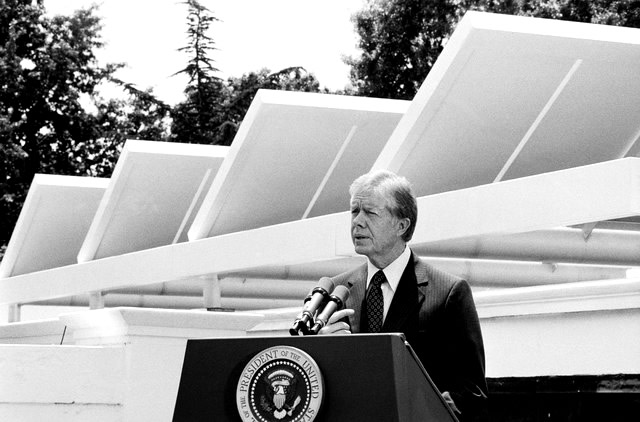For more than a century, scientists have tried to coax solar power into cheap energy. In 1955, University of California “solar scientists” envisioned an abundance of healthy food and clean energy for Earthlings and space colonists alike. It would cost next to nothing. Never quite happened.
But the sun’s power is there for the taking, and it seems we’re much closer to stealing fire from gods. From David Roberts at Vox:
Obviously, predicting the far future is a mug’s game if you take it too seriously. This post is more about storytelling, a way of seeing the present through a different lens, than pure prognostication. But storytelling is important. And insofar as one can feel confident about far-future predictions, I feel pretty good about this one.
Here it is: solar photovoltaic (PV) power is eventually going to dominate global energy. The question is not if, but when. Maybe it will happen radically faster than anyone expects — say, by 2050. Or maybe it won’t be until the year 3000, or later. But it’ll happen. …
One often hears energy experts talk about “distributed energy,” but insofar as that refers to electricity, it usually just means smaller gas or wind turbines scattered about — except in the case of solar PV. Only solar PV has the potential to eventually diffuse into infrastructure, to become a pervasive and unremarkable feature of the built environment.
That will make for a far, far more resilient energy system than today’s grid, which can be brought down by cascading failures emanating from a single point of vulnerability, a single line or substation. An intelligent grid in which everyone is always producing, consuming, and sharing energy at once cannot be crippled by the failure of one or a small group of nodes or lines. It simply routes around them.
Will solar PV provide enough energy? Right now, you couldn’t power a city like New York fully on solar PV even if you covered every square inch of it with panels. The question is whether that will still be true in 30 or 50 years. What efficiencies and innovations might be unlocked when solar cells and energy storage become more efficient and ubiquitous? When the entire city is harvesting and sharing energy? When today’s centralized, hub-and-spoke electricity grid has evolved into a self-healing, many-to-many energy web? When energy works like a real market, built on millions of real-time microtransactions among energy peers, rather than the crude statist model of today’s utilities?•
Tags: David Roberts

